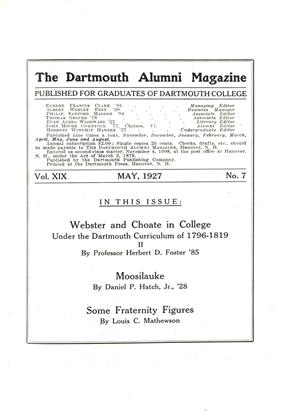(From The Springfield (Mass.) Republican) The changes recently made in the football rules show that, although the game has seen many modifications, it is not yet on a finally established basis as to the conditions which govern play when two teams line up on the field. It would be idle to forecast the results of the recommendations now made by President Hopkins of Dartmouth as to the rules governing the promotion of the game and the organization of the teams. But when so distinguished an educator follows others in recommending radical changes it is reasonable to expect, that, in the course of time, we shall see further developments affecting such vexed questions as paid coaching, schedules of so-called big games, periods of eligibility, and other matters held to be related to the exaggerated importance which football has undoubtedly assumed as one of the adjuncts of our American educational system.
President Hopkins's suggestion that only sophomores and juniors be eligible for varsity teams is novel, and is especially interesting in the convenient possibility of throwing a greater burden of coaching upon the seniors who, after two years' experience, would no longer be eligible for actual play. It may be a suggestion which will take the breath away from a good many football enthusiasts. But whatever the final reaction, it is a suggestion which differs only in degree, rather than in kind, from the change made some 20 years ago by the larger universities, and gradually followed since then by smaller institutions, which put into effect the requirement of a year's prior residence and so made freshmen ineligible for the 'varsity. Up to that time preparatory school stars, about to be enroled as freshmen, were thrown into the 'varsity lineup before they knew their way to the recitation halls. It was suspected that some of them, who disappeared from college after the football season, never had learned where those halls were located.
The suggestion of two football teams, one to play games on the home grounds and one elsewhere, would have the effect of further enlarging the number of those who participate, but seems likely to meet with more objection than a rule limiting eligibility to two years. So far as it might concern Yale, Harvard and Princeton, each university has, for a considerable period, limited itself to one out-of-town game, and that practice seems to have become a permanent custom. The organization of a team to play only one game would present obvious difficulties, and would not be likely to result in an equal contest with a squad having the advantage of a season's play. However, as the game has spread through the country, the "big three," as it was once called before the break of Harvard and Princeton, no longer enjoys its former football prestige. If conditions are more favorable to such a change at other colleges there is no reason why other colleges should not adopt it. But it appears much less practical than a two-year eligibility rule.
The college authorities lack in some ways an altogether free choice. They are confronted by the demands of alumni often more enthusiastic than wise. The developments of many years, whether represented by costly stadiums or by other branches of healthful athletics now financially supported on football profits, cannot be brushed aside in a moment. Yet the authorities must recognize their responsibility, as Dr. Hopkins does, and discharge it as best they can. They may sigh for the hands off policy and the "casual" organization of athletics at the English universities. But sighing will do no good. For many reasons, the chief of which is that it has been tried and failed, the hands-off policy will not do on this side of the water.
We are fairly launched in this country on a policy of organized athletic control, having for its purpose the health and physical development of every member of the student body so as to promote his efficiency in after life and his capacity for absorbing the intellectual stimulus offered him in undergraduate days. The only thing that our college authorities can do is gradually to improve that system of control. Improvement must come through criticism and suggested change from those who, like Dr. Hopkins, speak with the influence of recognized leadership and of warm sympathy with the student himself.
 View Full Issue
View Full Issue
More From This Issue
-
 Article
ArticleWEBSTER AND CHOATE IN COLLEGE
May 1927 By Herbert Darling Foster '85 -
 Article
ArticleTHE UNDERGRADUATE CHAIR
May 1927 -
 Article
ArticleMOOSILAUKE
May 1927 By Daniel P. Hatch, Jr. '28 -
 Article
ArticleSOME FRATERNITY FIGURES
May 1927 By Louis C. Mathewson -
 Article
ArticleDARTMOUTH STUDENTS SAID TO BE IRRELIGIOUS
May 1927 -
 Class Notes
Class NotesClass of 1921
May 1927 By Herrick Brown
Article
-
 Article
ArticleUNDERGRADUATE PUBLICATIONS
November 1918 -
 Article
Article"The Turkevich Team"
June 1960 -
 Article
ArticleThe Compleat Home Engineer
OCTOBER 1967 -
 Article
ArticleSWIMMING
January 1951 By Francis E. Merrill '26 -
 Article
ArticlePOMP AND CIRCUMSTANCE
January 1935 By Herbert F. Hill -
 Article
ArticleDriving Rachmaninoff
JUNE 1997 By Patricia Wetheraill


